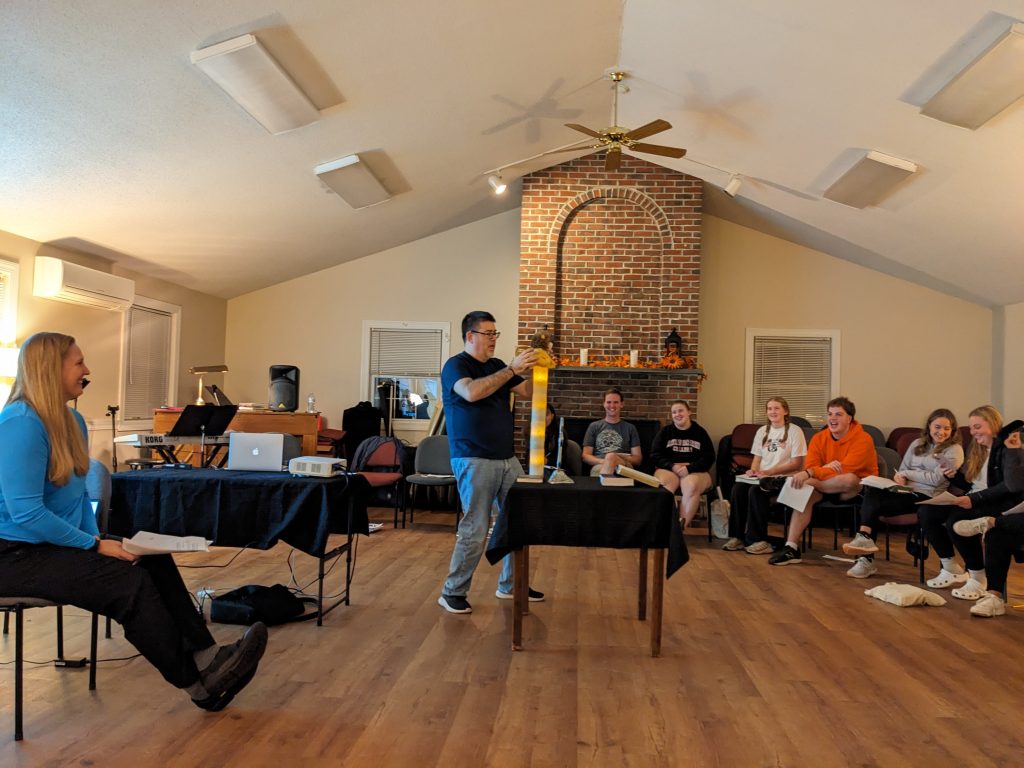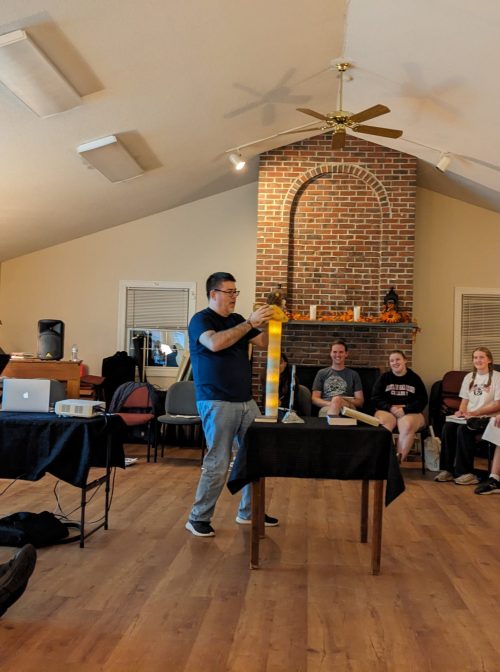The Christian tradition has a strong ethic of love, loving our neighbor and enemies. However, as a teacher/scholar rooted in the Christian faith, I have realized a crucial gap in our teachings – the absence of guidance and particular skill development on extending love and understanding to those with differing beliefs or social-political viewpoints.
Upon discovering Interfaith America’s Bridging the Gap project, I saw a unique opportunity to integrate conflict transformation skills into my Spiritual Formation class and our annual fall retreat.
Eastern Nazarene College in Quincy, Massachusetts, like so many academic institutions, has experienced heightened emotions this fall related to the ongoing violence in Gaza and Israel. Conversations on this issue often need more preparation and structure, overshadowed by the urgency to respond quickly without fostering genuine dialogue. The Bridging the Gap project and my desire to incorporate conflict transformation skills into my course and retreat could not have come at a better time.
Held towards the end of October in a New Hampshire retreat center, I got to lead our Spiritual Formation retreat on “Bridge Building.” We ended the weekend discussing the conflict in Gaza and Israel with 30 students, faculty, and their spouses who participated in the retreat. The underlying goal was to nurture bridge building skills rooted in a theological ethic of loving God, self, and others.

We used a version of an exercise called “Lay it on the Line,” where individuals positioned themselves on a spectrum related to a particular statement. We started with a fun statement about Dunkin Donuts and Starbucks. The original Dunkin Donuts location is 2 miles from Eastern Nazarene’s campus. So, students have strong opinions about their coffee.
The central part of the activity invited students to take a stance on a statement related to the Israel-Gaza conflict.
Then, participants engaged in structured conversations across the spectrum in three rounds of discussion. After each round, participants returned to where they originally stood “in the line.”
In each round, we designed questions that allowed participants to practice listening, storytelling, and engaging tension.
In round one, participants turned to the person next to them in the line. They discussed what positive attributes and values they could envision in someone who stood on the opposite side of the line.
For round two, participants found someone at a different place in the line who didn’t have a different position on the topic.

Participants responded to the questions, “Have you ever been anywhere else on the line at another point in your life? If not, what about your place on the line might you have questions about or be uncertain about? What information or experiences would encourage you to move one way or another?”
For the final round, students walked up to someone as far away from them in the line as they could. They shared and responded to the questions, “When did you first notice this topic? What were you doing? Where were you? Who were you with?”
What struck me profoundly was the remarkable engagement of both faculty and students. Usually seen as authority figures, the faculty navigated the conversations, reflecting, asking open-ended questions, and practicing conflict engagement skills. This involvement fostered courage in all participants, essential for authentic and transformative dialogue. Participants were amazed by their ability to converse with their faculty members and peers about such a complex topic.
One participant said, “I appreciated being invited to consider the evolution of my thinking.” Another said, “I was able to open up about areas of my life where I’ve experienced tension before (in other conversations).”
The retreat was a powerful reminder of the significance of preparation and training for dialogue as an integral part of spiritual formation. Genuine curiosity, the courage to engage people with different beliefs, and the art of openhearted listening emerged as meaningful takeaways.
Students shared that they hoped to practice curiosity, give more opportunities for pauses in conversation, interrupt less, and ask more open-ended questions of others. I am so grateful to Interfaith America and the Bridging the Gap project for helping me facilitate a significant experience for the moment we are all living in. The weekend showed me that the spiritual maturity journey transcends individual prayer practices. It encompasses the cultivation of relational and conflict-transformation skills. Within these dialogic spaces, we embody the Christian call to love others despite differing viewpoints, nurturing unity amidst diversity.
Julene Tegerstrand is an assistant professor of religion and culture at Eastern Nazarene College. As an intercultural studies professor and trained spiritual director, Tegerstrand is passionate about merging academia and contemplative practices. By teaching world religions, spiritual formation, conflict transformation, intercultural competency, and Christian missions, she hopes to inspire students to participate in everyday peacemaking.




